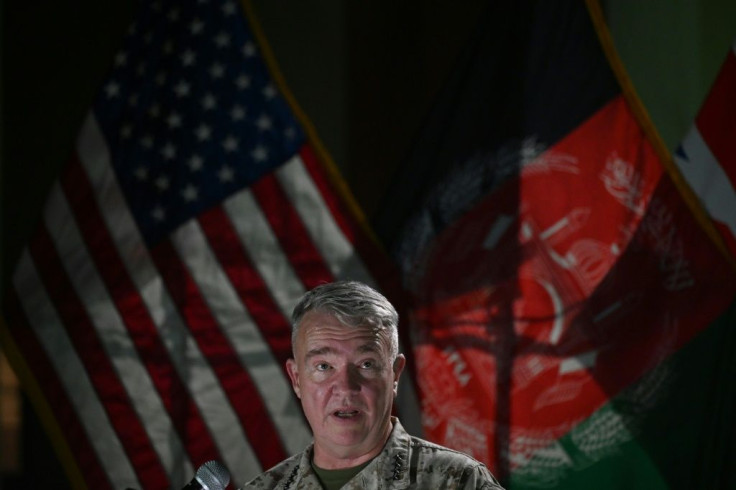A Top US General Warned Taliban To Stay Out Of Kabul, But They Just Rolled In
KEY POINTS
- Taliban leaders reportedly agreed to not interfere but still attacked Kabul the following day
- There have been earlier reports of Afghan allies being turned away at the Kabul airport
- Gen. Mark Milley, Defense Secretary Lloyd Austin, and McKenzie are set to face Congress questioning Tuesday
A top U.S. general had met Taliban leaders, including Taliban co-founder Abdul Ghani Baradar, in Qatar to warn them of keeping their fighters out of the Afghan capital for a few more days until the American troop pullout was implemented or else face the threat of airstrikes, but the insurgent group still charged into Kabul during pullout operations, according to a report.
Gen. Frank McKenzie, head of the U.S. Central Command, spoke with Baradar and showed him a map marked with a circle around Kabul, three senior defense officials told NBC News. The circle encompassed about 20 to 30 kilometers outside the capital city. McKenzie said the United States will complete its withdrawal of American troops as soon as possible, but warned the Taliban to not interfere with the process.
A U.S. general warned the Taliban to stay out of Kabul or be bombed. The Taliban rolled into Kabul anyway. https://t.co/ciXwd2A6fY
— NBC News (@NBCNews) September 28, 2021
Taliban leaders reportedly agreed to not come in the way of the pullout, but noted that some of their fighters were already stationed within the marked circle and other places. They said Taliban forces will not be removed from their stations. The insurgent group's leaders went on to offer a liaison for security around the Kabul airport, but the next day, they forced their way into the city without retribution by the U.S.
The three senior defense officials further revealed that the State Department and White House officials did not show interest in a U.S. military plan to evacuate at-risk Afghan allies who worked with American troops in the past. Two senior administration officials denied the report.
U.S. officials are turning away Afghans eligible for relocation in order to prioritize Americans and green card holders. Afghans are waiting days in line after being told to go to the airport, only to be rejected and then kicked out. https://t.co/2rCjR7rrI8
— Lauren Katzenberg (@Lkatzenberg) August 23, 2021
Earlier this month, a State Department official told the New York Times on condition of anonymity that some Afghan military interpreters and close U.S. allies were turned away from the Kabul airport by U.S. officials to prioritize green card holders and American citizens.
However, the State Department denied the report, saying in a statement to the Times that the department’s “overriding priority remains to put as many people as possible on departing planes as quickly as possible.”
Meanwhile, top Pentagon leaders are expected to face sharp questioning from Congress members over the American troop pullout from Afghanistan and the rapid downfall of the Afghan government once the Taliban seized Kabul last month.
McKenzie is expected to testify during the Congress hearing. Gen. Mark Milley, chairman of the Joint Chiefs of Staff, and Defense Secretary Lloyd Austin, are also scheduled to testify before the Senate Armed Services Committee on Tuesday, the Associated Press reported.
The Pentagon leaders will also appear before the House Armed Services Committee on Wednesday.
They are demanding more details on the suicide bombing in Kabul that killed 13 American service members. https://t.co/4vAcI4vKXh
— Katie Cox WRTV (@KatieJoCox) September 28, 2021
It is expected that Republicans will focus on getting more details about the suicide bombing outside the Kabul airport that killed dozens of Afghans and 13 U.S. service troops. Tuesday’s hearing will mark Milley and Austin’s first public testimony since the U.S. withdrawal.

© Copyright IBTimes 2024. All rights reserved.












